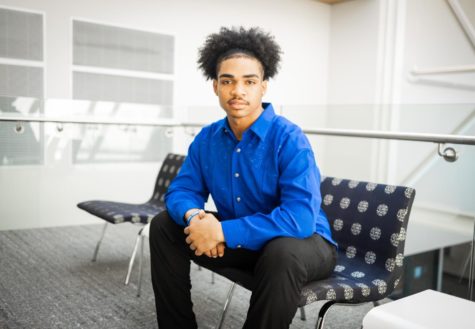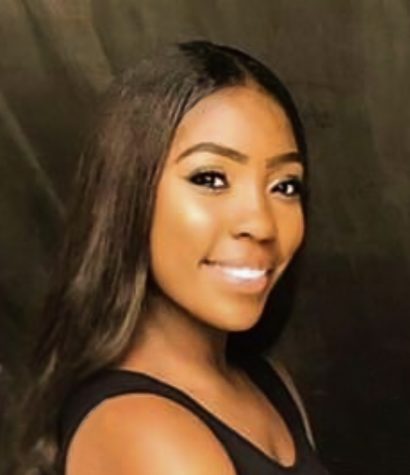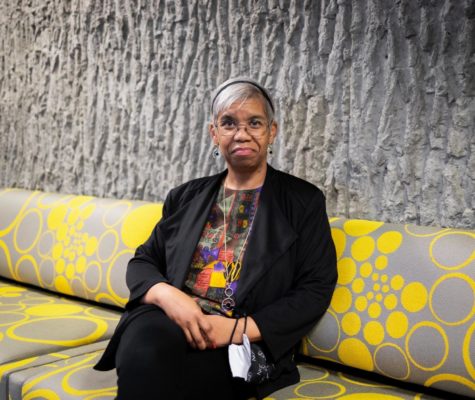The meaning of Black History Month, identity and community, according to NKU’s students and staff
Two African American students and a staff member share what Black History Month means for them.
February 24, 2022
Two African American students and a staff member share what Black History Month means for them, how their identity shapes their worldview and interaction with others, and what they are doing to support minority communities at Northern Kentucky University.
Tayshawn Elliott
Senior theatre major and dance minor Tayshawn Elliott came from Cincinnati. He is the first member of his family to go to college, compelled by his love for singing, though NKU was far from his first choice. He had never visited the NKU campus, feeling that it was too close to home, until his mother encouraged him to give the university a try.
“As soon as I was on the campus and started to see the people and talk with people, it was like something was speaking to me, pulling me,” Elliott said, “like, ‘This is where you’re supposed to be.’”
Elliott currently serves as president of the National Pan-Hellenic Council and Alpha Beta Rho chapter of Phi Beta Sigma Fraternity (he was the chapter’s first member). Though initially hesitant to run for president of NPHC, he decided to give it a shot last year after talking to several members who spoke positively of him.

NKU students, especially students from minority groups, need someone who is in the room to speak on their behalf, Elliott said: someone who has their best interests at heart, so that the students do not feel like their needs have to be questioned.
“That’s part of the reason that I’m in the position that I am in on campus, just so that I can be that person in the room for those who may not be able to be there,” Elliott said. “I try to speak up in any way, shape or form no matter who I’m speaking to, just letting them know that we’re important, we’re here, we matter.”
Elliott feels that NKU could be doing a lot more to accommodate minority students. He recalled walking into Greaves Concert Hall on his first day of class and seeing only three Black people in the room, out of an attendance of a hundred.
“It’s those types of things that you can choose to either let break you or build you,” Elliott said. “You take responsibility and say, ‘Okay, while I’m here I have to do my part as the person in the room, or speak up for the things that people might not have heard before or opinions that people may not be used to hearing.’”
But leadership can be hard on one mentally, which is why Elliott encouraged students to take care of themselves before they try to take on the world. “You can’t be a great student if you’re not being a great human first,” he added.
For Elliott, Black History Month is a reminder that we still have a long way to go in this country, but that the preceding generations were fighting for him.
“People before me came before me to fight for me, so I have to continue to do the same things for those who came after me,” he said.
It is a reminder to be proud of the accomplishments that African Americans have made, but also to see what they can do better for the community as a whole.
Elliott feels that a sense of camaraderie unites Black students because of the struggles they are facing together, making it all the more important for NKU to foster that community and provide them with what they need: spaces, financial help, faculty and staff who can help them be their best selves.
“We’re building people, like we’re literally releasing people with degrees into the world,” Elliott said. “This is a place where people are really finding themselves and putting that stamp on who they are, so we have to make sure this is a place where people feel wanted and comfortable. I’m trying my best with what I have.”
In his closing remark, Elliott reminded everyone to attend the End of Season Tailgate on Feb. 26, of which the Black Alumni Council will be a part.
Lavette Patterson
Cincinnatian Lavette Patterson, a senior dance major with a minor in Black studies, started dancing at the age of three and has been training in all dance styles since a very young age. She is currently rehearsing with School of the Arts for Dance ‘22, scheduled for the end of April. She will be featuring in the Feb. 22 Six@Six presentation “Democracy and the Arts” as one of the dancers interpreting the lecture through choreography.

She is also working with the Black Studies program to promote change in NKU’s lack of diversity and inclusion in its curriculum, which she finds to be tailored to white students in their structure and language. Her efforts will be represented by a March 26 workshop – with guest appearance by a Zimbabwean artist – where Black students can learn how to be good leaders and get a sense of their individual and collective power.
“What we’re doing really holds so much value to this community and other colleges as well, so I’m hoping a lot of students will be able to make it out to the event,” Patterson said.
For Patterson, Black History Month means remembering major Black figures and celebrating Black culture without feeling ashamed about it. Although she feels that the Black students community is filled with multitalented and very intelligent individuals, they are not as united as they could be – which she attributes to NKU’s lack of support for minority groups.
“Multiracial organizations are treated unfairly, funding-wise and promotion-wise, and it limits the opportunities to be a part of these groups and to be leaders in that community,” Patterson said. “When organizations like this aren’t supported equally, everybody suffers. If we aren’t supporting minority groups then we aren’t celebrating diversity and we hurt our own NKU community.”
Her solutions are more funding for different organizations and activities that bring people together, especially minority groups, to ensure that everyone is equally funded, supported and included within NKU’s dream of a community.
Dr. Marquita Barron
As Director of Training and Development for Human Resources, Dr. Marquita Barron calls herself a one-person team. Anything and everything related to training and development, be it consulting on professional development or helping facilitate learning, she does it.
“I’ve a long-time love of learning, not just learning for myself but helping others to learn, anything and everything that they want to, to make themselves the best that they could possibly be,” Barron said. “That’s really my love: helping individuals to discover, even rediscover, what it is that helps them to be exceptional people in the workforce.”

A native of Cincinnati, Barron earned her doctorate degree in human resources management in 2019 and started working at NKU in 2020. She has been ensuring that the staff performance evaluation has a diversity component, which requires employees to understand the importance of diversity and integrating it into how they help their students and their departments. She has also concentrated on including diversity into different programs for managers.
“It starts with faculty and staff really understanding what that all means, so we can help our students understand what that all means, so they can take that out there in the real world and be able to function appropriately,” Barron said, adding that NKU still has some ways to go and that a lot is being worked on behind the scenes.
Nevertheless, it was NKU’s student-driven mission, vision and core values – a focus on making sure that students have everything they need to be successful – that drew Barron to the institution. “It’s kind of been within my dream jobs to be the head of training and development,” she said.
Barron feels that this focus on students has also created a sense of community, even a sense of family, among NKU’s faculty and staff. “Everything that we say and do, it’s all about the students, all the time. We live it, we breathe it, we sleep it, we wake up: it’s all about the students,” she said. “We push it that way when we talk about and focus on our students, you can’t help but be a community.”
For Barron, Black History Month means an opportunity to reflect on the past, recognizing both the good and the bad, so that we can continue to learn and grow.
“I think a lot of these things came about that were good and great, not just for Black folks but for this country, stems from the original sense of America which was slavery,” Barron said. “To kind of recognize that we did have that history, to continuously be aware that we did have that history, to never lose focus that we did have that history, so that we can progress, move forward and do the things that we need to do to ensure that all of God’s creatures are created equal.”
Black History Month is also an opportunity to recognize the great contributions that African Americans have made and will continue to make for this country, Barron added. Her identity affords her the various lenses in which to view the world and her interaction with others.
“When I look in the mirror, the first thing I see is Black. Then I see a woman who is a little older and is a widow, a mother, grandmother, and on and on,” she said. “I have seen and experienced those things that social media is only now shining a light on, especially to those not privy or predisposed to experience such as injustices because of the color of one’s skin.”
Even in light of such injustices, Barron sees people as human beings who are flawed but able to do and be better. “We must be better,” she said.
In her closing remark, Barron encouraged everyone to participate in the events and activities happening on campus throughout the month, in particular the Ultimate Black Family Reunion on Feb. 25. Registration details for the mixer can be found on the African American Student Initiatives website.
This story also appeared in The Northerner’s Feb. 23 print newspaper. Pick up a copy at various locations around NKU’s campus.
